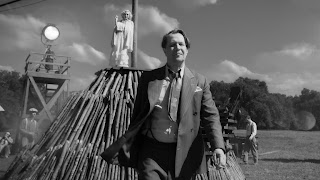It's 1940, and RKO studios provide wonderkid filmmaker Orson Welles (Tom Burke) with complete artistic freedom to mount his next project. He hires washed-up and unemployed writer Herman "Mank" Mankiewicz (Gary Oldman) to pen a screenplay. Mank is recovering from a broken leg suffered in a car crash, and Welles houses him in a secluded ranch, theoretically free of booze and distractions. Mank also agrees that Welles will receive sole writing credit for the completed script.
Under pressure to deliver in 60 days and assisted by secretary Rita Alexander (Lily Collins), Mank writes a script inspired by the life of newspaper tycoon William Randolph Hearst. Flashbacks reveal Mank's history in Hollywood starting in 1930. He encounters powerful moguls Louis B. Meyer (Arliss Howard) and Irving Thalberg (Ferdinand Kingsley), as well as actress Marion Davis (Amanda Seyfried) and her much older husband Hearst (Charles Dance). Mank's principled opposition to Meyer's meddling in politics, plus his excessive drinking, gradually dim his Hollywood status.
As the Citizen Kane script nears completion, Mank recognizes it as his best ever work, and decides he does indeed deserve credit for writing it.The geeky debate as to whether Welles or Mankiewicz are more responsible for Citizen Kane's greatness is a sub-niche topic for a small group of cineastes. Here director David Fincher, working from a script by his father Jack, attempts to transform the writing process into a flamboyant drama. The production quality is high, but predictably, the material is too thin to sustain the overly-ambitious 131 minutes.
Mank therefore meanders into a mini history of 1930s Hollywood, throwing in mundane socialist versus capitalist political shenanigans, routine power plays by the rich and influential, and one obscure cinematographer who takes it all too seriously. The flashbacks carry casual interest but dominate what is supposed to be the main plot. In the present-day scenes Mank's writing just flows forth, and beyond a childish game about smuggling alcohol to keep the juices flowing, few genuine insights are offered into the creative process.
Gary Oldman saves the day with a performance full of self-awareness, but even he is weighed down by the incessant wittiness of a writer who has a clever retort or quip for every situation. The period details recreate a booming Hollywood filled with schemers and dreamers, and the black and white cinematography courtesy of Erik Messerschmidt is crisp and grandiose, but the intended salute to Citizen Kane's visual style overwhelms Mank's much smaller story.
Mank is beautiful to look at, but this packaging is mightier than the pen.
All Ace Black Movie Blog reviews are here.














No comments:
Post a Comment
We welcome reader comments about this post.